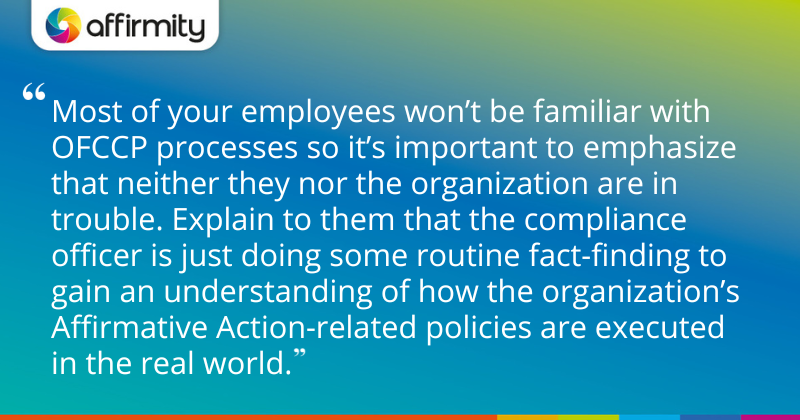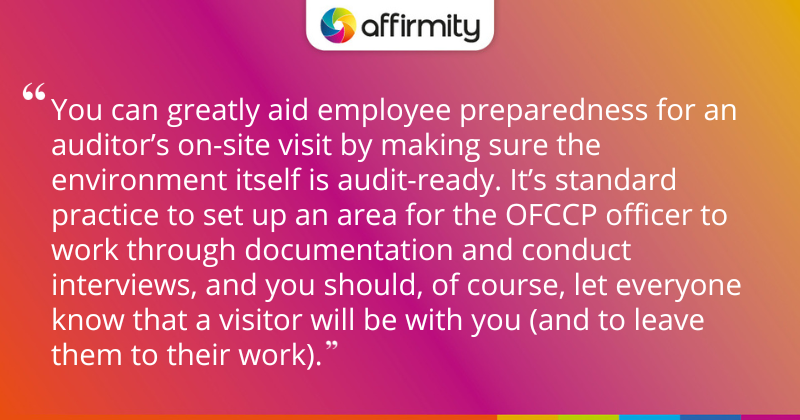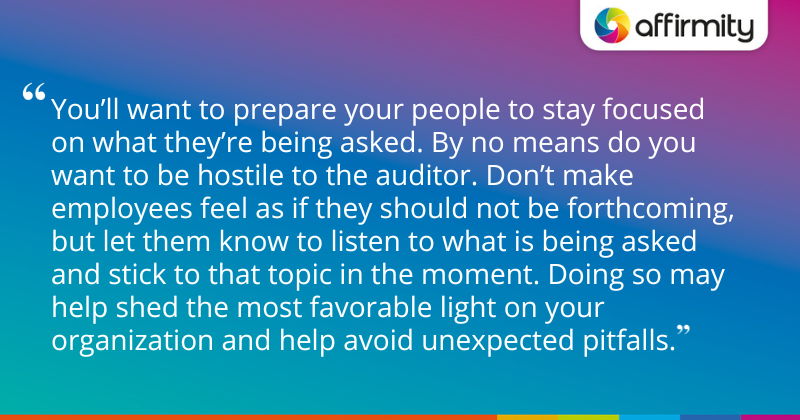As part of an OFCCP audit, a compliance officer may request to come on site to speak to employees and supervisors. Though reduced office attendance has made routine in-person visits less common in recent years, video interviews have continued and real-world visits are likely to pick up again. A visit in either form is nothing to be concerned about. Nonetheless, you should take a proactive approach to preparing your employees. Here are four things to do if the OFCCP needs to interview your people.
1) Put Your Employees’ Minds at Ease
Whether in-person or on a call, you can expect most employees to be caught slightly off-guard when they find out that the government wants to talk to them. Nobody really wants to be interviewed by the government, so it’s important to put their minds at ease!
Most of your employees won’t be familiar with OFCCP processes so it’s important to emphasize that neither they nor the organization are in trouble. Explain to them that the compliance officer is just doing some routine fact-finding to gain an understanding of how the organization’s Affirmative Action-related policies are executed in the real world.
Also, let them know that they’re allowed to say they don’t want to be interviewed if they aren’t comfortable. However, it’s important that your organization leaves this decision up to the employees—don’t try to urge them or discourage them, just let them know what’s happening and that you cannot tell them what to say or do.
ALSO ON THE BLOG | ‘The Basics of the Law and DE&I in Your Talent Acquisition’

2) Take the Opportunity to Refresh Managers on Key Information
While your job may involve knowing the ins and outs of various compliance-related policies, your employees may not remember the details as well as you do. In anticipation of questions that an auditor may ask, it may be worth giving management employees a refresher. They should be able to answer basic questions regarding:
- Where policies are on your systems
- How promotions are handled
- How candidates can request an accommodation
- How employees can request and take medical leave
Bear in mind that managers may be assumed to be speaking for your organization in a way that general employees are not. Accordingly, you will usually be allowed to have a compliance team member “in the room” during the interview. However, it’s still important that they can answer questions like those above unprompted. After all, these are things they should be able to answer if asked by their direct reports.
PREPARE FOR OFCCP COMPLIANCE WITH OUR VIDEO SERIES | ‘OFCCP Compliance Series Episode 1: Essential Components of an Affirmative Action Program’

3) Prepare the Workplace for the Visit
You can greatly aid employee preparedness for an auditor’s on-site visit by making sure the environment itself is audit-ready. It’s standard practice to set up an area for the OFCCP officer to work through documentation and conduct interviews, and you should, of course, let everyone know that a visitor will be with you (and to leave them to their work).
Before they arrive, you should also take the opportunity to self-audit your facilities and ensure that everything is accessible and compliant. Particularly review whether:
- Access points adequately accommodate individuals with disabilities
- Accessible parking spaces are easy to identify and are otherwise fit for purpose
- All compliance-related posters are visible where employees and potential applicants can see them, and up to date
If the compliance officer is performing their review remotely, you may still need to provide proof that the above are present and correct. Your premises may have been unoccupied in recent years—it always pays to double-check that everything is up to date and in compliance with all applicable regulations.
MORE ON AUDIT PREPAREDNESS | ‘3 Ways to Maintain Your Affirmative Action Program and Sustain Success’

4) Encourage Employees to Give Straightforward Answers
One key reminder when under audit is that you only need to answer the questions they’re asking you. In any part of the process you can needlessly create problems for everyone involved by providing too much information—even if your intentions are only to illustrate the full breadth of the great work you know you’re doing.
This principle applies to the answers that your employees give. Even an enthusiastic and highly-engaged employee who just wants to tell stories they think will be helpful might say something that can end up backfiring.
With this in mind, you’ll want to prepare your people to stay focused on what they’re being asked. By no means do you want to be hostile to the auditor—you want to be friendly to them, to be accommodating, and to work with them. But you do want to make sure that everyone is focused on providing straightforward and truthful answers to any line of questioning. Don’t make employees feel as if they should not be forthcoming, but let them know to listen to what is being asked and stick to that topic in the moment. Doing so may help shed the most favorable light on your organization and help avoid unexpected pitfalls.
Discover how Affirmity can help you prepare for affirmative action planning and audit activity: check out our Affirmative Action Plan services or contact us for more information.
 About the Author
About the Author
Brad Wiltshire is a Manager of Consulting Services at Affirmity. He has 15 years of experience developing Affirmative Action Plans as well as EEO-1, and VETS reports for clients across many industries. A former attorney, Mr. Wiltshire’s legal background has helped him provide ongoing guidance and support for OFCCP audits and other compliance needs. Connect with him on LinkedIn.
